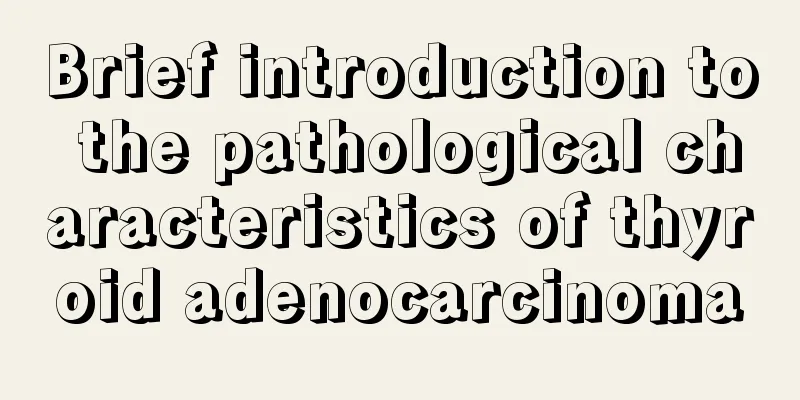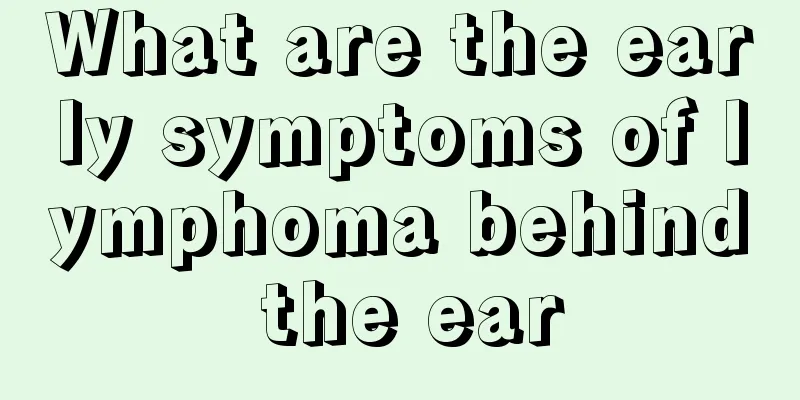Brief introduction to the pathological characteristics of thyroid adenocarcinoma

|
In today's society, as people's pace of life accelerates, many people have irregular lifestyles, abnormal diets, and lack of exercise, which can easily lead to various diseases in the body. Among them, thyroid cancer is a very common disease. Let me introduce the pathological characteristics of thyroid cancer to you. Thyroid cancer is a common malignant tumor, accounting for about 1/3 of primary epithelial thyroid tumors. There are four common pathological features of thyroid cancer: 1. Papillary carcinoma: It is the most common type of thyroid cancer. Macroscopically, the tumor is generally round, about 2-3 cm in diameter, without capsule, hard in texture, and grayish white in cut surface. In some cases, cysts are formed, and nipples can be seen in the cysts, so it is called papillary cystadenocarcinoma. Microscopically, the nipple has many branches, and there is fibrovascular stroma (true papilla) in the center of the nipple. Concentric calcified bodies, i.e. psammoma bodies, are common in the stroma, which are helpful for diagnosis. Papillary carcinoma sometimes appears as a microcancer with a diameter of less than 1 cm, which is clinically called "occult cancer". 2. Follicular carcinoma: generally more malignant than papillary carcinoma and with a worse prognosis. Macroscopically: nodular, with incomplete capsule, relatively clear borders, grayish white cut surface, and soft texture. Microscopically: follicles of varying degrees of differentiation can be seen. A small number of cases are composed of eosinophilic cancer cells, which are called eosinophilic carcinoma. 3. Medullary carcinoma: Also known as C-cell carcinoma, it is a malignant tumor that arises from parafollicular cells (i.e., C cells) and is an AUPD tumor. Macroscopically: single or multiple, with pseudocapsules, about 1-11 cm in diameter, grayish white or yellowish brown in cross section, solid and soft. Microscopically: tumor cells are round or polygonal, spindle-shaped, with round or oval nuclei and inconspicuous nucleoli. Tumor cells are arranged in solid sheet nests or papillary or follicular shapes, and amyloid substances are often deposited in the stroma (possibly related to calcitonin secretion). Electron microscopy: There are neurosecretory granules of relatively uniform size in the cytoplasm. 4. Undifferentiated cancer: also known as anaplastic cancer or sarcomatoid cancer, less common. Macroscopic observation: large mass, irregular lesions, no capsule, extensive infiltration and destruction, gray-white cut surface, often with bleeding and necrosis. Microscopic observation: cancer cells vary in size, shape, and staining depth, with many nuclear divisions. We hope that the above introduction to the pathological characteristics of thyroid cancer will be helpful to patients so that they can receive symptomatic treatment and recover soon. |
<<: What is the cause of benign thyroid cancer?
>>: What is the cause of thyroid cancer?
Recommend
What are the symptoms of testicular cancer? Here are six points to pay attention to
After suffering from testicular cancer, the affec...
How to deal with a child's high fever and convulsions
When a child has pneumonia or a cold, it is easy ...
What are the methods of TCM to treat rectal cancer
If the patient has rectal cancer in the early sta...
What should we pay attention to in psychological care of anxious patients
Being a psychological nurse for anxious patients ...
The advantages and disadvantages of water purifier
Now water purifiers are becoming more and more po...
How to remove oil stains from clothes
Oil stains on clothes are one of the most common ...
Symptoms and signs of ovarian cancer
Symptoms of ovarian cancer generally include abdo...
What are the 7 liver function tests
Liver function examination mainly checks the prot...
How to treat the small red bumps on the glans?
There are some small red bumps on the glans penis...
How to treat calluses on soles of feet
Many women often wear high heels, and the long-te...
Swimming crab and flower crab
Many people like to eat crabs. Crabs are rich in ...
Is massage useful for cervical vertebrae problems?
Cervical spondylosis is a common white-collar dis...
What early symptoms can identify lung cancer? You should also know the causes of lung cancer
If lung cancer has developed to the late stage, t...
One minute method to fall asleep
More and more people are having a headache when i...
Can eating loquat raw relieve cough?
Cough is a common symptom and a disease that many...









